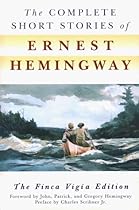 Image via Wikipedia
Image via Wikipedia Hemingway's stories are poetry: that is my first and lasting impression of Ernest Hemingway's short stories. In his short stories, Hemingway treats words as sparsely as do poets.
I don't usually understand or enjoy poetry because it feels so much must be inferred or interpreted. While reading Ernest Hemingway's stories, I likewise felt the need to infer and interpret beyond my comfort zone: I didn't "get" them and I certainly didn't enjoy reading the few stories I read. While I've only read a dozen of Ernest Hemingway's short stories, I'm finished.
That, however, doesn't mean you should avoid Hemingway's stories: they may resonate with you, and you may love his writing style. He does a magnificent job of capturing a scene through dialog. Hemingway is worth reading.
Two Stories to Read
 While I didn't love any of the stories, there are two I would recommend others read. "The Snows of Kilimanjaro" follows an unsuccessful writer as he dies of gangrene in the middle of an African hunting camp, stranded after his vehicle broke down. It is a story with two aspects: one part follows the dialog he has with his wife, and one part follows what he is thinking and all the stories he wished he had written.
While I didn't love any of the stories, there are two I would recommend others read. "The Snows of Kilimanjaro" follows an unsuccessful writer as he dies of gangrene in the middle of an African hunting camp, stranded after his vehicle broke down. It is a story with two aspects: one part follows the dialog he has with his wife, and one part follows what he is thinking and all the stories he wished he had written.The second story I'd recommend is "A Clean, Well-Lighted Place," which I'd read before and is probably the most well-known of his stories. In that story, a deaf, widowed old man who has recently attempted suicide sits and drinks late into the night in a café. One waiter essentially kicks out the old man because he wants to go home, while the other waiter contemplates on how the café is a nice place to sit, and everyone needs a place.
I like the stories behind these, and I like the summary of them as I write them up now (although I know I did a poor job, since there is lots of symbolism in them that I've missed). What I disliked about Hemingway's stories was the writing style. The stories were dialog driven, and the parts that were not dialog (such as the writer's thoughts in "The Snows of Kilimanjaro"), felt like run-on sentences (although all were grammatically correct). His stories also end abruptly, as did James Joyce's stories that I read recently. Hemingway was not a bad writer; he is brilliant at controlling each tight scene. For me, however, the style was irritating: I've decided that Hemingway is just not for me.
Cross-posted in slightly different form here.


No comments:
Post a Comment